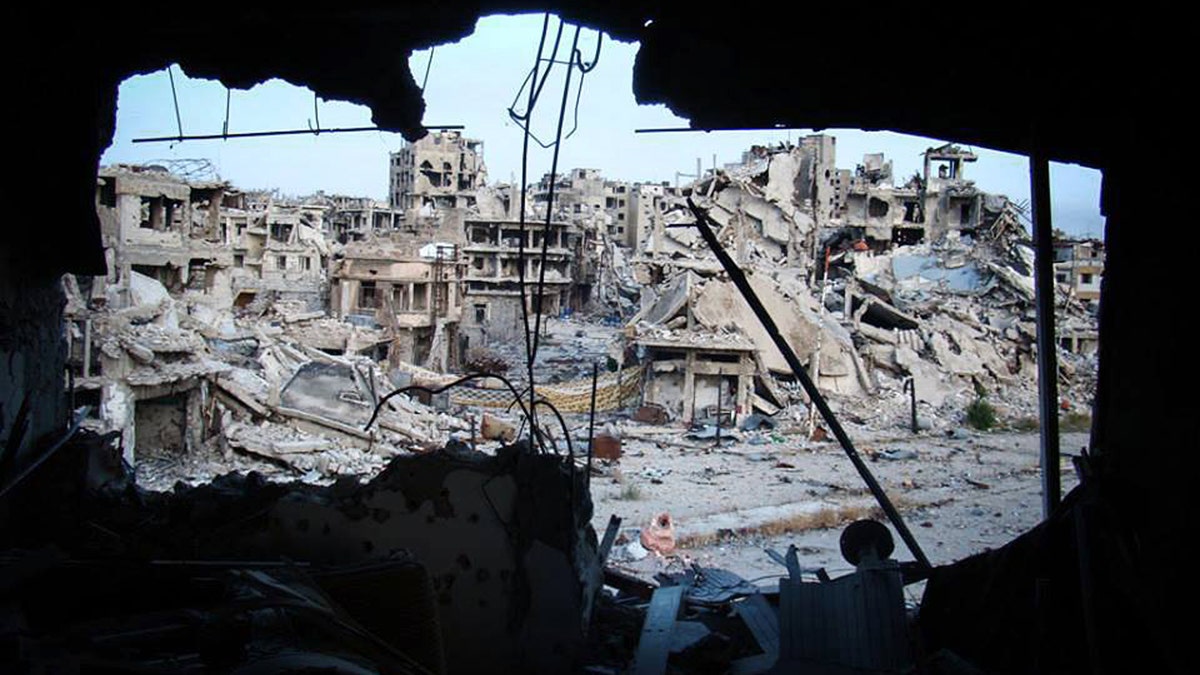
June 5, 2013: In this citizen journalism image provided by Lens Young Homsi, which has been authenticated based on its contents and other AP reporting, shows damaged buildings are seen in the Jouret al-Chiyah neighborhood, Homs province, central Syria. (AP)
BEIRUT – Syrian troops backed by Hezbollah fighters pressed on with their offensive Friday in the country's opposition heartland, taking two small villages near a strategic town that was captured by the government this week.
Following Wednesday's capture of Qusair, President Bashar Assad's forces appear to have directed their efforts toward driving rebels from the country's densely populated heartland, including the cities of Homs and Aleppo.
Government forces faced little resistance Friday as they took control of the central villages of Salhiyeh and Masoudiyeh, just north of Qusair, activists and the state news agency SANA said. On Thursday, the rebels also lost control the nearby village of Dabaa.
The push brought Assad's troops and their Hezbollah allies to the edge of al-Buweida village, also north of Qusair, where most of the rebels who withdrew from Qusair took up positions and regrouped. State TV reported government troops were pursuing rebels there.
Casualties from Friday's clashes were not immediately known but the past three weeks of fierce fighting have left dozens of rebels, troops and Hezbollah fighters dead.
Since joining the battle in Qusair in full force in April, the Lebanese militant Hezbollah group has helped tip the balance of power to Assad's side, enabling the regime to take most of the towns and villages near the border with Lebanon.
Meanwhile, the World Food Program said in a statement Friday that it has distributed urgent food aid to "vulnerable families" in Qusair through the Syrian Red Crescent society, marking the first time aid workers have entered the town in months.
The statement said WFP sent family food rations -- enough to feed 2,500 people -- for distribution Thursday in Qusair.
In northern Syria, rebels attacked a military air base and fired tank shells at its command building but failed to capture it, the Britain-based Syrian Observatory for Human Rights said.
The Mannagh air base has been under rebel siege for months but Mohammed Said, an Aleppo-based activist, said the rebels have failed to advance their attack on the facility.
There were also sporadic clashes Friday in the southern Syrian region of Quneitra in the Golan Heights, the Observatory reported. On Thursday, the rebels briefly seized control of a border crossing to the Israeli-controlled part of the area but government troops re-captured it later in the day.
The clashes prompted the withdrawal of a major Austrian peacekeeping contingent that is part of a U.N. force that patrols the contested area, heightening fears in Israel that Syria's civil war could soon arrive at its doorstep.
The Syrian conflict started with largely peaceful protests against Assad's regime in March 2011, but later degenerated into a bloody civil war that has killed more than 80,000 people, according to the United Nations.
The conflict has also raised tensions considerably in neighboring Lebanon, which is sharply split along sectarian lines and between supporters and opponents of Assad. The open involvement by Hezbollah fighters in Syria has further enflamed sectarian hatreds in Lebanon -- a fragile country scarred by its own 15-year civil war -- and led to recurrent and deadly street clashes between opposing groups.
In a rare statement, the Lebanese army warned Friday of "plots" to drag the country back to civil war.
"Some groups appear determined to stoke security tensions ... against the backdrop of political divisions in Lebanon over military developments in Syria," the statement said.
The military vowed to take firm action against anyone who tries to tamper with the country's security, saying "the use of weapons will be met with weapons."
Also Friday, the U.N. launched its biggest humanitarian appeal ever to help millions of Syrians suffering the effects of the conflict. U.N. aid agencies and independent relief organizations need $5.2 billion to fund their operations in Syria and neighboring countries until the end of the year, the global body said.
The figure presented at an international conference in Geneva represents a sharp increase from the $3 billion the U.N. had previously estimated it would need this year, of which only $1.4 billion has so far been pledged.
"The situation has deteriorated drastically," said Valerie Amos, the U.N.'s top humanitarian official.
Meanwhile, the French president called on Friday for the release of two French journalists missing in Syria, saying their lives were at risk. Francois Hollande, who was in Tokyo on a state visit, told reporters that he could not reveal details about the two.
"Their lives are at risk, so I cannot say anything more," Holland said. "I want them released as soon as possible."
The French radio broadcaster Europe 1 said in a statement on its website that it was unable to get in touch with reporter Didier Franτois and photographer Edouard Elias who had left the Turkish-Syrian border, heading for Aleppo. Europe 1 said it was keeping in touch with French authorities in an effort to gain more information.
Hollande said it is essential that media be able to travel throughout Syria to help keep the world informed about the worsening humanitarian situation in the country.
